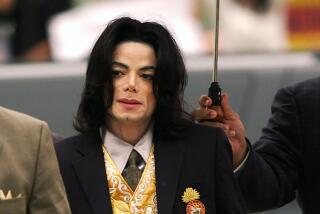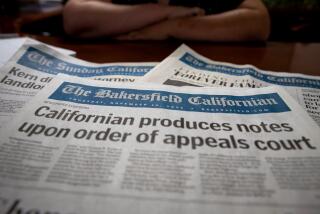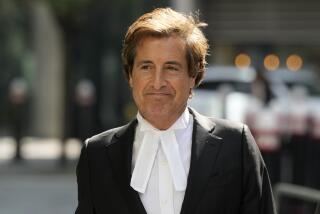Judge Bars Journalist’s Testimony in Jackson Trial, but Allows Jurors to See ‘Boy’ Books
- Share via
SANTA MARIA, Calif. — Prosecutors in the Michael Jackson child molestation trial were handed a small defeat Friday when a judge barred testimony from a journalist who said he may have heard one of the singer’s aides speak of the alleged victim’s family “escaping” from Neverland.
But they won a minor victory when the judge agreed that prosecutors could show jurors two books filled with photos -- some nude -- of young boys. “Boys Will Be Boys” and “The Boy: A Photographic Essay” were seized by police during a raid of Jackson’s Neverland ranch in 1993.
The “escaping” testimony was important to prosecutors because it would have bolstered their allegation that Jackson held his then-13-year-old accuser and his family at Neverland against their will. Jackson also is charged with conspiracy in the alleged captivity, as well as giving liquor to a minor.
But after a hearing outside the presence of the jury, Santa Barbara Superior Court Judge Rodney S. Melville concluded that the testimony from Ian Drew, an editor for Us Weekly, would have been of dubious value.
Melville held the hearing to determine how much of Drew’s testimony would be admissible under California’s shield law. Under the law, journalists can not be compelled to reveal confidential sources or answer questions in court about information they have not published.
Just days from wrapping up their case, prosecutors wanted jurors to hear just one thing from Drew. The journalist had told investigators that Ronald Konitzer, formerly one of Jackson’s top assistants and one of five uncharged alleged co-conspirators, told him in February 2003 that a scheduled interview with the alleged victim’s family was off.
“I was told they had disappeared,” Drew said in court. “I believe the word ‘escaped’ was used.” But prosecutors could present Drew’s testimony to jurors only if Jackson attorney Thomas A. Mesereau Jr. could cross-examine him.
That grilling would have been an empty exercise, Melville decided, because Drew could legitimately fend off almost every question by citing the state’s shield law. In fact, when Mesereau, with jurors still absent, asked him seemingly innocuous test questions, such as “Where did the conversation take place?”, Kelli Sager, a 1st Amendment attorney representing Drew, successfully objected.
Also, Drew told the judge that he may not have heard Konitzer say “escaped.”
“I was on deadline trying to get a story done,” he said. “I remember the tone of the conversation more than his exact words.”
The books admitted into evidence Friday were found in a locked filing cabinet inside a locked closet in Jackson’s bedroom suite. There was no indication they had been shown to minors.
In court, the books were described as depicting boys swimming, jumping, running and generally having a good time. Some of the photos “could be determined to be sexually explicit,” Melville said.
Prosecutors contended the books would help jurors evaluate evidence about previous molestation accusations against Jackson. Melville decided to admit the past allegations under a state law that allows prosecutors to present evidence of previous sexual allegations, even if the acts are decades old and no charges were filed. Most of the older allegations stem from the period when the books were found.
“The Boy” apparently was a gift from a fan named Rhonda, who inscribed it to Jackson “with hearts, XXXXOOOO” in 1983. “Boys Will Be Boys” was inscribed by Jackson.
“Look at the true spirit of happiness and joy in these boys’ faces,” he wrote. “This is the spirit of boyhood -- a life that I’ve never had and will always dream of. This is the life I want for my children.”
More to Read
Sign up for Essential California
The most important California stories and recommendations in your inbox every morning.
You may occasionally receive promotional content from the Los Angeles Times.











